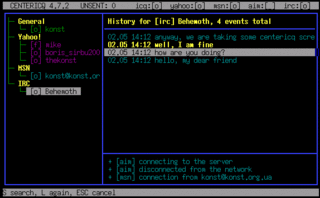
Pidgin is a free and open-source multi-platform instant messaging client, based on a library named libpurple that has support for many instant messaging protocols, allowing the user to simultaneously log in to various services from a single application, with a single interface for both popular and obsolete protocols, thus avoiding the hassle of having to deal with a new software for each device and protocol.

Extensible Messaging and Presence Protocol is an open communication protocol designed for instant messaging (IM), presence information, and contact list maintenance. Based on XML, it enables the near-real-time exchange of structured data between two or more network entities. Designed to be extensible, the protocol offers a multitude of applications beyond traditional IM in the broader realm of message-oriented middleware, including signalling for VoIP, video, file transfer, gaming and other uses.

Kopete is a multi-protocol, free software instant messaging client released as part of the KDE Software Compilation. Although it can run in numerous environments, it was designed for and integrates with the KDE Plasma Workspaces. Kopete was started because ICQ blocked Licq from their network in 2001. According to the original author, Duncan Mac-Vicar Prett, the name comes from the Chilean Spanish word copete, meaning "a drink with your friends". Kopete has been nominated for multiple awards. The designated successor is KDE Telepathy from the KDE RTCC Initiative.

Adium is a free and open source instant messaging client for macOS that supports multiple IM networks, including Google Talk and XMPP. In the past, it has also supported AIM, ICQ, Windows Live Messenger and Yahoo! Messenger. Adium is written using macOS's Cocoa API, and it is released under the GNU GPL-2.0-or-later and many other licenses for components that are distributed with Adium.

Centericq is a text mode menu- and window-driven instant messaging interface that supports the ICQ, Yahoo!, AIM, MSN, IRC, XMPP, LiveJournal, and Gadu-Gadu protocols.
HCL Sametime Premium is a client–server application and middleware platform that provides real-time, unified communications and collaboration for enterprises. Those capabilities include presence information, enterprise instant messaging, web conferencing, community collaboration, and telephony capabilities and integration. Currently it is developed and sold by HCL Software, a division of Indian company HCL Technologies, until 2019 by the Lotus Software division of IBM.

Google Talk was an instant messaging service that provided both text and voice communication. The instant messaging service was variously referred to colloquially as Gchat, Gtalk, or Gmessage among its users.

BitlBee is a cross-platform IRC instant messaging gateway, licensed under the terms of the GNU General Public License.

Gajim is an instant messaging client for the XMPP protocol which uses the GTK toolkit. The name Gajim is a recursive acronym for Gajim's a jabber instant messenger. Gajim runs on Linux, BSD, macOS, and Microsoft Windows. Released under the GPL-3.0-only license, Gajim is free software. A 2009 round-up of similar software on Tom's Hardware found version 0.12.1 "the lightest and fastest jabber IM client".
Off-the-Record Messaging (OTR) is a cryptographic protocol that provides encryption for instant messaging conversations. OTR uses a combination of AES symmetric-key algorithm with 128 bits key length, the Diffie–Hellman key exchange with 1536 bits group size, and the SHA-1 hash function. In addition to authentication and encryption, OTR provides forward secrecy and malleable encryption.

Skype for Business Server is real-time communications server software that provides the infrastructure for enterprise instant messaging, presence, VoIP, ad hoc and structured conferences and PSTN connectivity through a third-party gateway or SIP trunk. These features are available within an organization, between organizations and with external users on the public internet or standard phones.
The following tables compare general and technical information between a number of notable IRC client programs which have been discussed in independent, reliable prior published sources.

Bombus is a GPL instant messaging client for the XMPP protocol. It is written in Java, and runs on Java ME/MIDP capable cellphones, including Windows Mobile platform with installed Java ME virtual machine, or any other platform, where Java ME is available. There was successful compilations of Bombue for Android.

Empathy is an instant messaging (IM) and voice over IP (VoIP) client which supports text, voice, video, file transfers, and inter-application communication over various IM communication protocols.

Kadu is a free and open source multi-platform instant messaging client that supports Gadu-Gadu, XMPP IM networks and other services based on XMPP like Google Talk. It is written in C++ using Qt Framework, and released under the GNU GPL-2.0-or-later.

QIP is a multiprotocol instant messaging client. It is a closed source freeware program originally developed by Ilgam Zyulkorneev. In 2008 it was bought by RosBusinessConsulting media group and named most popular RBC service in 2009.

aMSN was a free Windows Live Messenger clone. aMSN attempted to emulate the look and feel of Windows Live Messenger, and supported many of its features. It had been downloaded approximately 40 million times as of January 2011, making it the 21st most downloaded project on SourceForge.

Spark is an open-source instant messaging program that allows users to communicate in real time. It can be integrated with the Openfire server to provide additional features such as controlling the various Spark functionalities from a central management console, or integrating with a proprietary customer support service known as Fastpath which allows its users to interact with the platform using the Spark client. Being a cross-platform application, Spark can run on various systems. Installers for Windows, macOS and Linux are available on the official website.

OMEMO is an extension to the Extensible Messaging and Presence Protocol (XMPP) for multi-client end-to-end encryption developed by Andreas Straub. According to Straub, OMEMO uses the Double Ratchet Algorithm "to provide multi-end to multi-end encryption, allowing messages to be synchronized securely across multiple clients, even if some of them are offline". The name "OMEMO" is a recursive acronym for "OMEMO Multi-End Message and Object Encryption". It is an open standard based on the Double Ratchet Algorithm and the Personal Eventing Protocol . OMEMO offers future and forward secrecy and deniability with message synchronization and offline delivery.

Conversations is a free software, instant messaging client application software for Android. It is largely based on recognized open standards such as the Extensible Messaging and Presence Protocol (XMPP) and Transport Layer Security (TLS).















